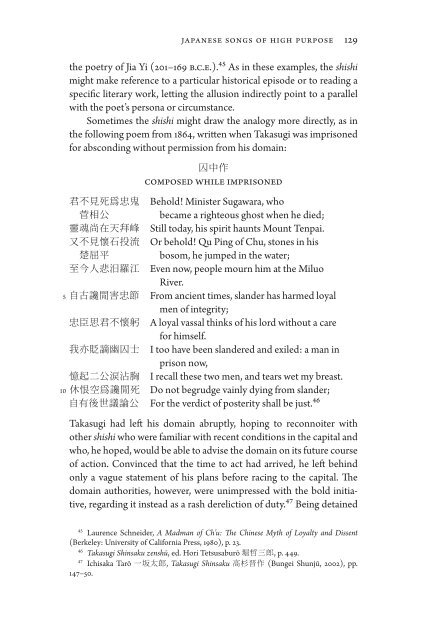Songs of the Righteous Spirit: âMen of High Purposeâ and Their ...
Songs of the Righteous Spirit: âMen of High Purposeâ and Their ...
Songs of the Righteous Spirit: âMen of High Purposeâ and Their ...
You also want an ePaper? Increase the reach of your titles
YUMPU automatically turns print PDFs into web optimized ePapers that Google loves.
JAPANESE SONGS OF HIGH PURPOSE 129<strong>the</strong> poetry <strong>of</strong> Jia Yi (201–169 B.C.E.).45 As in <strong>the</strong>se examples, <strong>the</strong> shishimight make reference to a particular historical episode or to reading aspecific literary work, letting <strong>the</strong> allusion indirectly point to a parallelwith <strong>the</strong> poet’s persona or circumstance.Sometimes <strong>the</strong> shishi might draw <strong>the</strong> analogy more directly, as in<strong>the</strong> following poem from 1864, written when Takasugi was imprisonedfor absconding without permission from his domain:囚 中 作Composed while imprisoned君 不 見 死 爲 忠 鬼 Behold! Minister Sugawara, who菅 相 公became a righteous ghost when he died;靈 魂 尚 在 天 拜 峰 Still today, his spirit haunts Mount Tenpai.又 不 見 懷 石 投 流 Or behold! Qu Ping <strong>of</strong> Chu, stones in his楚 屈 平bosom, he jumped in <strong>the</strong> water;至 今 人 悲 汨 羅 江 Even now, people mourn him at <strong>the</strong> MiluoRiver.5 自 古 讒 閒 害 忠 節 From ancient times, sl<strong>and</strong>er has harmed loyalmen <strong>of</strong> integrity;忠 臣 思 君 不 懷 躬 A loyal vassal thinks <strong>of</strong> his lord without a carefor himself.我 亦 貶 謫 幽 囚 士 I too have been sl<strong>and</strong>ered <strong>and</strong> exiled: a man inprison now,憶 起 二 公 涙 沾 胸 I recall <strong>the</strong>se two men, <strong>and</strong> tears wet my breast.10 休 恨 空 爲 讒 閒 死 Do not begrudge vainly dying from sl<strong>and</strong>er;自 有 後 世 議 論 公 For <strong>the</strong> verdict <strong>of</strong> posterity shall be just.46Takasugi had left his domain abruptly, hoping to reconnoiter witho<strong>the</strong>r shishi who were familiar with recent conditions in <strong>the</strong> capital <strong>and</strong>who, he hoped, would be able to advise <strong>the</strong> domain on its future course<strong>of</strong> action. Convinced that <strong>the</strong> time to act had arrived, he left behindonly a vague statement <strong>of</strong> his plans before racing to <strong>the</strong> capital. Thedomain authorities, however, were unimpressed with <strong>the</strong> bold initiative,regard ing it instead as a rash dereliction <strong>of</strong> duty.47 Being detained45Laurence Schneider, A Madman <strong>of</strong> Ch’u: The Chinese Myth <strong>of</strong> Loyalty <strong>and</strong> Dissent(Berkeley: University <strong>of</strong> California Press, 1980), p. 23.46Takasugi Shinsaku zenshū, ed. Hori Tetsusaburō 堀 哲 三 郎 , p. 449.47Ichisaka Tarō 一 坂 太 郎 , Takasugi Shinsaku 高 杉 晋 作 (Bungei Shunjū, 2002), pp.147–50.













